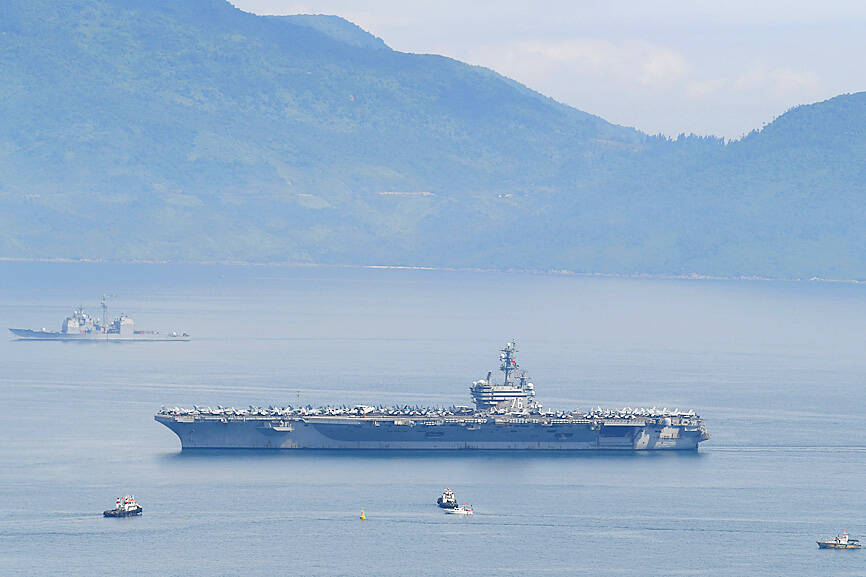A US aircraft carrier yesterday arrived in the central Vietnamese city of Danang, weeks after Hanoi protested against Chinese vessels sailing in its waters.
The USS Ronald Reagan’s port call in Danang comes as the US and Vietnam celebrate the 10th anniversary of their “comprehensive partnership.”
The aircraft carrier — part of the US Seventh Fleet “supporting a free and open Indo-Pacific region” — arrived with two escort ships, the guided-missile cruisers USS Antietam and USS Robert Smalls, the US embassy in Hanoi said.

Photo: AFP
US Navy officials disembarked and shook hands with their Vietnamese counterparts in a afternoon brief ceremony.
“More than 5,000 sailors aboard USS Ronald Reagan are eager to visit Danang and experience Vietnamese culture,” Captain Daryle Cardone, of the USS Ronald Reagan, said in a statement.
Vietnam and the US share increasingly close trade links, as well as concerns over China’s growing strength in the region.
A Chinese survey vessel, multiple coast guard ships and fishing boats operated for several weeks in Vietnam’s exclusive economic zone in the South China Sea, prompting the Vietnamese Ministry of Foreign Affairs to demand that they leave.
The boats eventually left early this month.
“The visit gives that message that Vietnam is continuing to balance against China by improving its security relationship with the US, and with other outside powers,” said Nguyen The Phuong, a doctoral candidate in maritime security at the University of New South Wales Canberra.
The US aircraft carrier’s visit follows the arrival of Indian naval ships in Danang last month, as well as a port call by Japan’s largest warship in Cam Ranh, a city on the southeastern coast, earlier this week.
Vietnamese Ministry of Foreign Affairs spokesman Pham Thu Hang said earlier in the week that port calls were an “ordinary friendship exchange for peace, stability, and cooperation and development in the region and the world.”
This is the third visit by a US aircraft carrier to Vietnam after a historic port call by the USS Carl Vinson in 2018, the first time such a ship had arrived in the country since the end of the Vietnam War.
The visit includes several cultural and community events, such as a US Navy band concert, a visit to an orphanage and sports matches.

AIR SUPPORT: The Ministry of National Defense thanked the US for the delivery, adding that it was an indicator of the White House’s commitment to the Taiwan Relations Act Deputy Minister of National Defense Po Horng-huei (柏鴻輝) and Representative to the US Alexander Yui on Friday attended a delivery ceremony for the first of Taiwan’s long-awaited 66 F-16C/D Block 70 jets at a Lockheed Martin Corp factory in Greenville, South Carolina. “We are so proud to be the global home of the F-16 and to support Taiwan’s air defense capabilities,” US Representative William Timmons wrote on X, alongside a photograph of Taiwanese and US officials at the event. The F-16C/D Block 70 jets Taiwan ordered have the same capabilities as aircraft that had been upgraded to F-16Vs. The batch of Lockheed Martin

GRIDLOCK: The National Fire Agency’s Special Search and Rescue team is on standby to travel to the countries to help out with the rescue effort A powerful earthquake rocked Myanmar and neighboring Thailand yesterday, killing at least three people in Bangkok and burying dozens when a high-rise building under construction collapsed. Footage shared on social media from Myanmar’s second-largest city showed widespread destruction, raising fears that many were trapped under the rubble or killed. The magnitude 7.7 earthquake, with an epicenter near Mandalay in Myanmar, struck at midday and was followed by a strong magnitude 6.4 aftershock. The extent of death, injury and destruction — especially in Myanmar, which is embroiled in a civil war and where information is tightly controlled at the best of times —

Taiwan was ranked the fourth-safest country in the world with a score of 82.9, trailing only Andorra, the United Arab Emirates and Qatar in Numbeo’s Safety Index by Country report. Taiwan’s score improved by 0.1 points compared with last year’s mid-year report, which had Taiwan fourth with a score of 82.8. However, both scores were lower than in last year’s first review, when Taiwan scored 83.3, and are a long way from when Taiwan was named the second-safest country in the world in 2021, scoring 84.8. Taiwan ranked higher than Singapore in ninth with a score of 77.4 and Japan in 10th with

SECURITY RISK: If there is a conflict between China and Taiwan, ‘there would likely be significant consequences to global economic and security interests,’ it said China remains the top military and cyber threat to the US and continues to make progress on capabilities to seize Taiwan, a report by US intelligence agencies said on Tuesday. The report provides an overview of the “collective insights” of top US intelligence agencies about the security threats to the US posed by foreign nations and criminal organizations. In its Annual Threat Assessment, the agencies divided threats facing the US into two broad categories, “nonstate transnational criminals and terrorists” and “major state actors,” with China, Russia, Iran and North Korea named. Of those countries, “China presents the most comprehensive and robust military threat